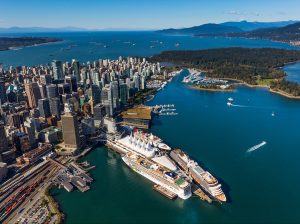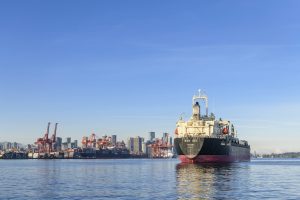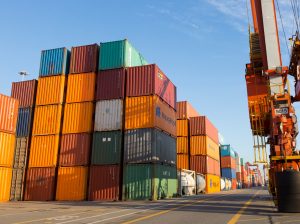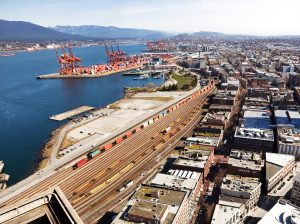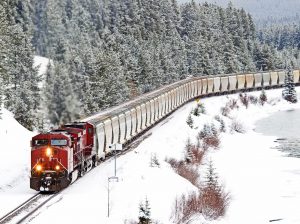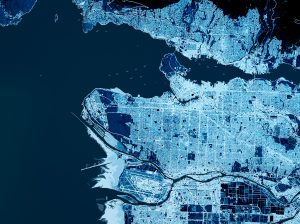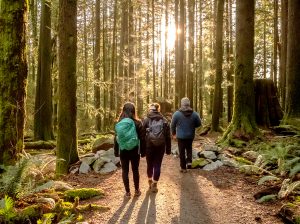The complex web of global trade and supply chain logistics practically hums with technical innovation. But sometimes, something as simple as a suburban stoplight, a prairie snowstorm, or traffic congestion can threaten to bring the entire global system to a standstill, creating what industry insiders commonly call a bottleneck. In this new podcast series, we’ll break these bottlenecks open by exploring the intricacies, infrastructure and innovations that connect Canada’s businesses and communities with the world, as seen through the inner workings of the Port of Vancouver, Canada’s largest port, and those who rely on it.
Season 2: The Resilient PortBreaking Bottlenecks – Season 2 trailer Season 2, episode 5: The Ultimate Bottleneck: Climate Change
On this episode of Breaking Bottlenecks, brought to you by the Vancouver-Fraser Port Authority, host Aaron Chapman tackles one of the most pressing issues of our time, in an eye-opening look at what the port and its partners are doing to engage with the crisis head-on. You’ll hear how weather events like historic heat and record-shattering storms are driving innovation along all parts of the supply chain, forcing companies to adapt their operations, in real-time, to keep the flow of goods moving and the economy chugging along. Aaron will also explore what those same companies are doing to mitigate potentially bigger challenges in the future by reducing their emissions and embracing sustainability today. Featuring interviews and commentary from: Season 2, episode 4: Becalmed: How the cruise industry battled back from COVID
In this episode of Breaking Bottlenecks, brought to you by the Vancouver Fraser Port Authority, host Aaron Chapman speaks with some of the key people who worked tirelessly to bring cruise ships back to Vancouver, after two cancelled seasons, regulatory changes, and setbacks. In an industry built on interdependencies and connections, we’ll hear how members of this complex ecosystem, including service-providers, suppliers, cruise companies, and government unite to not only get ships back in motion, but bring them back with a new-found resilience. Featuring interviews and commentary from:
Featuring interviews and commentary from: Season 2, episode 2: Contained
Featuring interviews and commentary from:
In Episode 1 of Breaking Bottlenecks, host Aaron Chapman is joined by industry insiders to examine the state of the global supply chain through the lens of the Port of Vancouver. We’ll hear from industry leaders as they discuss the stresses, successes and innovations, as the modern maritime industry adapted to bottlenecks during a global pandemic in real time and on an unprecedented scale. Featuring interviews and commentary from: |
|
On this episode we look at the quintessential bottleneck: capacity. How much of something can you move, and how fast? To get a better sense of this, we’ll explore two iconic elements of Canada—grain and winter—and the journey from prairie to port, and beyond. Plus, we’ll find out how data-sharing is changing the way Canada does business, and is earning the port a global reputation for efficiency. You’ll hear from Peter Xotta, vice president, planning and operations at the Vancouver Fraser Port Authority, Jeff Edwards, the AVP of marketing and strategy for demand management at CP Rail, and Kyle Jeworski, president and CEO of Viterra, in Regina. |
|
As shipping increases and the industrial land base shrinks—especially prime trade-enabling real estate along Vancouver’s waterfront—how do we balance increased growth in trade with limited space? The answer involves some creative thinking around maximizing land use, and a lot of collaboration with terminal operators, governing bodies, and local communities. On this episode of Breaking Bottlenecks, brought to you by the Vancouver Fraser Port Authority, host Aaron Chapman speaks with Brad Eshleman, president of Western Stevedoring, Theresa Rawle, manager of planning and development at the port authority, along with the port authority’s director of infrastructure delivery, Devan Fitch. |
|
People in Vancouver care deeply about the environment. But in an industry where freight, weight, and delivery date have historically driven decisions, how do we work to lessen our environmental impact, while still keeping shipping lines and terminal operators afloat? On this episode of Breaking Bottlenecks, brought to you by the Vancouver Fraser Port Authority, host Aaron Chapman speaks with Joel Werner, the Director of Engineering and Projects at DP World, – which operates the Centerm container terminal in Vancouver, as well as Peter Idema, Viterra’s director of West Coast Terminal Operations. He also hears from the port authority’s director of environmental programs, Carrie Brown, and their vice president of planning and operations, Peter Xotta. |
|
Port infrastructure expansion benefits the economy, but can also raise questions in surrounding communities. Public perception can make or break a project, which is why it’s critically important for communities and industry to work together. North Vancouver’s Low-Level Road and Spirit Trail Project is a great example of this cooperation in action. On this episode of Breaking Bottlenecks, brought to you by the Vancouver Fraser Port Authority, join host Aaron Chapman as he digs into the neighbourly negotiations that preceded this epic rail and road expansion project. Hear from Lisa Dooling, the Director of Community and Stakeholder Engagement at Neptune Terminals, Linda Buchanan, current Mayor of the City of North Vancouver, and the port authority’s vice president of environment, community and government affairs, Duncan Wilson. |

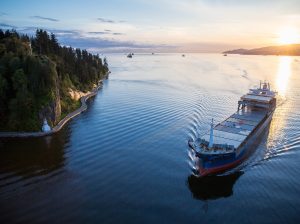 It’s a challenge so immense, it really does require an “all hands on-deck” approach: climate change. By the year 2050, extreme weather events exacerbated by our warming world are expected to cost the economy almost 140-billion dollars in Canada alone.
It’s a challenge so immense, it really does require an “all hands on-deck” approach: climate change. By the year 2050, extreme weather events exacerbated by our warming world are expected to cost the economy almost 140-billion dollars in Canada alone.